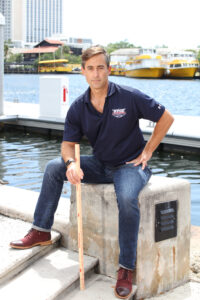By Colin Polsky
Welcome to The Invading Sea! We’re delighted you’ve come to explore the fascinating and evolving questions and solutions about climate change and other environmental issues in Florida.
I’ve been in the climate change field for close to 30 years. My academic training is in climate social science. As such, my research, teaching and community engagement explore how people create, perceive and respond to climate challenges.

My projects have included calculating U.S. greenhouse gas emissions and sinks; estimating agricultural climate sensitivities in the U.S. Great Plains; examining lawn-care practices in several U.S. metropolitan regions; and understanding flood risk perceptions among Gulf Coast and Southeast Florida residents and business leaders.
Throughout these three decades of theoretical and applied climate work, there have been many moments of despair. It often seemed like we faced obstacles too tall and strong to overcome.
Yet I’ve never been more optimistic about us successfully overcoming our challenges than I am today. There remains a lot of work to do, and the clock is ticking fast. But in 2023 the prospects are brighter than ever.
One reason for my optimism is the emergence of information resources like The Invading Sea. Here you can review news, engage opinions and ask questions. Click the “About us” page to learn more about this award-winning website.
 How is this website different from the others? For starters, we focus on Florida. Contributors can come from anywhere, but each piece of content needs to speak, directly or indirectly, to the Florida case.
How is this website different from the others? For starters, we focus on Florida. Contributors can come from anywhere, but each piece of content needs to speak, directly or indirectly, to the Florida case.
Second, we are aggressively non-partisan and civil. We will surely see — and we will actively invite — differing opinions. But this website is not a place for blaming and shaming, or ad hominem attacks.
Third, our content is unabashedly curiosity-driven. Knowing how we know, for example, that Florida has been roughly twice – and half – as wide as today, is for me as inspiring as watching the Space Shuttle launch.
Fourth, our content is easily understandable and brief. We will point you to other websites for more detailed and technical explanations.
Fifth, our content, by virtue of its journalistic and scientific oversight, will be fact-based. We will publish only what we know to be the best understanding of any topic at that time, and we will highlight areas of active dispute.
Finally, here you’ll find content that is at times light-hearted. Climate change can feel depressing and daunting. But we can’t fail to see the humor and irony that sometimes arise. Like that time the senator brought a snowball to the Senate floor, claiming the snow proves that global warming was fake. That was funny. So too was watching him try to not get wet from the melting.
In closing, this is an exciting time for climate change research, teaching and community engagement. In Florida, The Invading Sea is a part of that excitement. We have a new editor, Nathan Crabbe, a seasoned Florida journalist, who will do the heavy lifting to make this venture a success.
Thank you in advance for being an integral part of exploring what we’re facing, and how we can thrive while responding.
Colin Polsky, the director of Florida Atlantic University’s Center for Environmental Studies and a professor of geosciences, oversees The Invading Sea.



